- Home
- James Clavell
Whirlwind
Whirlwind Read online
WHIRLWIND
is the fifth novel in the Asian Saga
that so far consists of;
A.D. 1600
Shōgun
A.D. 1841
Tai-Pan
A.D. 1945
King Rat
A.D. 1963
Noble House
A.D. 1979
Whirlwind
Copyright © 1986 by James and April Clavell
Maps and endpapers by Paul J. Pugliese
All rights reserved.
No part of this book may be reproduced or utilized in any form or by any means, electronic or mechanical, including photocopying, recording or by any information storage and retrieval system, without permission in writing from the Publisher. Inquiries should be addressed to Permissions Department, William Morrow and Company, Inc., 105 Madison Ave., New York, N.Y. 10016.
Library of Congress Cataloging-in-Publication Data
Clavell, James.
James Clavell’s whirlwind.
I. Title. II. Title; Whirlwind.
PS3553.L354W5 1986 813'.54 86-11293
ISBN 0-688-06663-1
Printed in the United States of America
First Edition
1 2 3 4 5 6 7 8 9 10
This adventure story is set in revolutionary Iran, between February 9 and March 4, 1979, long before the hostage crisis began. I’ve tried to make it seem as real as possible—but it is fiction, with imaginary characters and many imaginary places. No reference to any living person or company that was or is part of the era is intended. Of course, the shadows of the opposing giants, HIH Shah Mohammed Pahlavi (and his father Reza Shah) and Imam Khomeini, that are cast upon my imaginary characters are a vital part of this story, though the leaders personally are not portrayed. I have tried to present an accurate but fictional picture of those times, of the different kinds of people who endured them, the sorts of opinions that existed and would have been expressed, but nothing herein is meant by me in disrespect.
This is a story, not as things really happened, but as I imagined they came to pass within those twenty-four days…
For
Shigatsu
They have sown the wind,
and they shall reap the whirlwind.
—Hosea 8:7
Contents
Books in the Asian Saga
Copyright
Author’s note
Dedication
Epigraph
BOOK ONE
FRIDAY – February 9, 1979
CHAPTER 1
CHAPTER 2
CHAPTER 3
SATURDAY – February 10
CHAPTER 4
CHAPTER 5
CHAPTER 6
CHAPTER 7
CHAPTER 8
SUNDAY – February 11
CHAPTER 9
CHAPTER 10
CHAPTER 11
CHAPTER 12
CHAPTER 13
MONDAY – February 12
CHAPTER 14
CHAPTER 15
CHAPTER 16
CHAPTER 17
CHAPTER 18
CHAPTER 19
CHAPTER 20
TUESDAY – February 13
CHAPTER 21
CHAPTER 22
CHAPTER 23
CHAPTER 24
CHAPTER 25
CHAPTER 26
WEDNESDAY – February 14
CHAPTER 27
CHAPTER 28
CHAPTER 29
BOOK TWO
SATURDAY – February 17
CHAPTER 30
CHAPTER 31
CHAPTER 32
CHAPTER 33
SUNDAY – February 18
CHAPTER 34
CHAPTER 35
CHAPTER 36
CHAPTER 37
CHAPTER 38
TUESDAY – February 20
CHAPTER 39
CHAPTER 40
CHAPTER 41
BOOK THREE
THURSDAY – February 22
CHAPTER 42
FRIDAY – February 23
CHAPTER 43
CHAPTER 44
CHAPTER 45
SATURDAY – February 24
CHAPTER 46
CHAPTER 47
CHAPTER 48
SUNDAY – February 25
CHAPTER 49
MONDAY – February 26
CHAPTER 50
CHAPTER 51
TUESDAY – February 27
CHAPTER 52
CHAPTER 53
WEDNESDAY – February 28
CHAPTER 54
THURSDAY – March 1
CHAPTER 55
CHAPTER 56
CHAPTER 57
CHAPTER 58
CHAPTER 59
BOOK FOUR
FRIDAY – March 2, 1979
CHAPTER 60
CHAPTER 61
CHAPTER 62
CHAPTER 63
CHAPTER 64
CHAPTER 65
CHAPTER 66
CHAPTER 67
CHAPTER 68
CHAPTER 69
SATURDAY – March 3
CHAPTER 70
CHAPTER 71
SUNDAY – March 4
CHAPTER 72
BOOK ONE
FRIDAY
February 9, 1979
IN THE ZAGROS MOUNTAINS: SUNSET. Now the sun touched the horizon and the man reined in his horse tiredly, glad that the time for prayer had come.
Hussain Kowissi was a powerfully built Iranian of thirty-four, his skin light and his eyes and beard very dark. Over his shoulder was a Soviet AK47 assault rifle. He was bundled against the cold and wore a white turban and travel-stained dark robes with a rough, nomad Kash’kai sheepskin jacket belted over them, and well-used boots. Because his ears were muffled he did not hear the distant scream of the approaching jet helicopter. Behind him his weary pack camel tugged at the halter, impatient for food and rest. Absently he cursed her as he dismounted.
The air was thin at this height, almost eight thousand feet, and cold, very cold, a heavy snow on the ground that the wind took into drifts, making the way slippery and treacherous. Below, the little-known track curled toward distant valleys, at length to Isfahan where he had been. Ahead the path wound dangerously upward through the crags, then to other valleys facing the Persian Gulf and to the town of Kowiss where he had been born, where he now lived and from which he had taken his name when he had become a mullah.
He did not mind the danger or the cold. The danger felt clean to him as the air was clean.
It’s almost as though I was once more a nomad, he thought, my grandfather leading us as in the old days when all our tribes of the Kash’kai could roam from winter pasture to summer pasture, a horse and a gun for every man and herds to spare, our flocks of sheep and goats and camels a multitude, our women unveiled, our tribes living free as our forefathers had done for tens of centuries, subject to no one but the Will of God—the old days that were ended barely sixty years ago, he told himself, his anger rising, ended by Reza Khan, the upstart soldier who with the help of the vile British usurped the throne, proclaimed himself Reza Shah, first of the Pahlavi Shahs, and then, with the support of his Cossack regiment, curbed us and tried to stamp us out.
God’s work that in time Reza Shah was humiliated and exiled by his foul British masters to die forgotten, God’s work that Mohammed Shah was forced to flee a few days ago, God’s work that Khomeini has returned to lead His revolution, the Will of God that tomorrow or the next day I will be martyred, God’s pleasure that we’re swept by His whirlwind and that now there will be a final reckoning on all Shah lackeys and all foreigners.
The helicopter was closer now but still he did not hear it, the whine of the gusting wind helping to bury the sound. Contentedly he pulled o
ut his prayer rug and spread it on the snow, his back still aching from the weals that the whip had caused, then scooped up a handful of snow. Ritually he washed his hands and face, preparing for the fourth prayer of the day, then faced southwest toward the Holy City of Mecca that lay a thousand miles away in Saudi Arabia, and put his mind to God.
“Allah-u Akbar, Allah-u Akbar. La illah illa Allah…” As he repeated the Shahada he prostrated himself, letting the Arabic words embrace him: God is most Great, God is most Great. I testify there is no other God but God and Mohammed is His Prophet. God is most Great, God is most Great, I testify there is no other God but God and Mohammed is His Prophet…
The wind picked up, colder now. Then through his earmuffs he caught the pulse of the jet engine. It grew and grew and went into his head and drove away his peace and ruined his concentration. Angrily he opened his eyes. The approaching helicopter was barely two hundred feet above the ground, climbing straight toward him.
At first he thought it might be an army aircraft and a sudden fear went into him that they were searching for him. Then he recognized the British red, white, and blue colors and familiar markings of the bold S-G around the red lion of Scotland on the fuselage—the same helicopter company that operated from the air base at Kowiss and all over Iran—so his fear left him but not his rage. He watched it, hating what it represented. Its course was almost directly overhead but it presented no danger to him—he doubted if those aboard would notice him, here in the lee of an outcrop—even so, with all of his being, he resented the intrusion into his peace, and destruction of his prayers. And as the ear-shattering scream increased, his anger soared.
“La illah illa Allah…” He tried to go back into prayer but now the thrust of the blades whirled the snow into his face. Behind him his horse whinnied and cavorted in sudden panic, the hobble making him slip and slide. The pack camel, jerked by the halter, equally in panic, reeled to her feet, bellowing, and stumbled this way and that on three legs, shaking her load and fouling the bindings.
His rage burst. “Infidel!” he bellowed at the airplane that now was almost over the lip of the mountain, leaped to his feet, and grabbed his gun, slipped the safety and let off a burst, then corrected and emptied the magazine.
“SATAN!” he shrieked in the sudden silence.
When the first bullets splashed the chopper, the young pilot, Scot Gavallan, was momentarily paralyzed and he stared stupidly at the holes in the plastic canopy ahead. “Christ Almighty…” he gasped, never having been fired on before, but his words were drowned by the man in the front seat beside him whose reactions were honed and battle fast: “Hit the deck!” The command roared in his headphones.
“Hit the deck,” Tom Lochart shouted again into his boom mike, then, because he had no controls of his own, he overrode the pilot’s left hand and shoved the collective lever down, cutting lift and power abruptly. The chopper reeled drunkenly, instantly losing height. At that moment the second burst sprayed them. There was an ominous crack above and behind, somewhere else a bullet howled off metal, the jets coughed, and the chopper fell out of the sky.
She was a 206 Jet Ranger, one pilot, four passengers, one in front, three in the back and she was full. An hour ago Scot had routinely picked up the others back from a month’s home leave at Shiraz Airport, fifty-odd miles southeast, but now routine was nightmare and the mountain rushed at them until just over a ridge the earth tumbled away miraculously and the chopper sank into a depression, giving him a split second of respite to get back air power and partial control.
“Watch out for crissake!” Lochart said.
Scot had seen the hazard but not as quickly. Now his hands and feet slid the plane into a shuddering swerve around the jutting outcrop, the left skid of the undercarriage caught the rocks a glancing blow, howled in protest, and once more they plunged away barely a few feet above the uneven surface of rocks and trees that fell and reeled up again.
“Low and fast,” Lochart said, “that way, Scot—no, that way, over there, down that crest into the ravine… Are you hit?”
“No, no, I don’t think so. You?”
“No, you’re fine now, drop into the ravine, come on, hurry!”
Scot Gavallan banked obediently and fled, too low and too fast and his mind not quite normal yet. There was still the taste of bile in his mouth and his heart was pumping. From behind the partition he could hear the shouts and curses of the others in the back above the roar of the engines, but he could not risk turning and said anxiously into the intercom, “Anyone hurt back there, Tom?”
“Forget them, concentrate, watch the ridge, I’ll deal with them!” Tom Lochart said urgently, his eyes searching everywhere. He was forty-two, Canadian, ex-RAF, ex-mercenary, and now chief pilot of their base, Zagros Three. “Watch the ridge and get ready to evade again. Hug the deck and keep her low. Watchittt!”
The ridge was slightly above them and it came at them too fast. Gavallan saw the fang of rocks directly in his path. He just had time to lurch around it when a violent gust shoved him perilously near to the sheer side of the ravine. He overcorrected and heard the obscenity in his earphones, got back control. Then ahead he saw the trees and the rocks and the sudden end to the ravine and he knew they were lost.
Abruptly everything seemed to slow down for him. “Christ Al—”
“Hard aport…watch the rock!”
Scot felt his hands and feet obey and saw the chopper pirouette the rocks by inches, slam for the trees, ride over them, and escape into free air.
“Set her down over there, fast as you can.”
He gaped at Lochart, his insides still churning. “What?”
“Sure. We better take a look, check her out,” Lochart said urgently, hating not having the controls. “I heard something go.”
“So did I, but what about the undercart, it might be torn off?”
“Just keep her weight off. I’ll slip out and check it, then if it’s all right, set her down and I’ll make a quick inspect. Safer to do that; Christ only knows if the bullets chopped an oil line or nicked a cable.” Lochart saw Scot take his eyes off the clearing to glance around at his passengers. “The hell with them for crissake, I’ll deal with them,” he said sharply. “You concentrate on the landing.” He saw the younger man flush but obey, then, trying to contain his sudden nausea, Lochart turned around expecting blood splashed everywhere and entrails and someone screaming—screams drowned by the jet engines—knowing there was nothing he could do until they reached sanctuary and landed, always the first duty to land safely.
To his aching relief the three men in the backseat—two mechanics and another pilot—were seemingly unhurt though they were all hunched down, and Jordon, the mechanic directly behind Scot, was white-faced, holding his head with both hands. Lochart turned back.
They were about fifty feet now, on a good approach, coming in fast. In the clearing the surface was stark and white and flat with no tufts of grass showing through, the snow banked high at the sides. Seemingly a good choice. Easily enough room to maneuver and land. But how to judge the depth of snow and the hidden level of the earth beneath? Lochart knew what he would do if he had the controls. But he did not have control, he was not the captain though he was senior. “They’re okay in the back, Scot.”
“Thank God for that,” Scot Gavallan said. “You set to get out?”
“How’s the surface look to you?”
Scot heard the caution in Lochart’s voice, instantly aborted the landing, put on power and went into a hover. Christ, he thought, almost in panic at his stupidity, if Tom hadn’t nudged me I’d’ve put down there and Christ knows how deep the snow is or what’s underneath! He steadied at a hundred feet and searched the mountainside. “Thanks, Tom. What about over there?”
The new clearing was smaller, a few hundred yards away across the other side of the valley, lower down with a good escape route if they needed one, and protected from the wind. The ground was almost clear of snow, rough but serviceable.
&
nbsp; “Looks better to me too.” Lochart slid one earphone away and looked back. “Hey, Jean-Luc,” he shouted over the engines, “you all right?”
“Yes. I heard something go.”
“So did we. Jordon, you all right?”
“Course I’m all effing right, for Gawd’s sake,” Jordon shouted back sourly. He was a lean, tough Australian and he was shaking his head like a dog. “Just banged my bleeding head, didn’t I? Bloody effing bullets! I thought Scot said things were getting bleeding better with the bleeding Shah gone and Khomeini bleeding back. Better? Now they’re bleeding firing at us! They’ve never done that before—what the eff’s going on?”
“How the hell do I know? Probably just a trigger-happy nutter. Sit tight, I’m going to take a quick look. If the undercart’s okay we’ll set down and you and Rod can make a check.”
“How’s the effing oil pressure?” Jordon shouted.
“In the Green.” Lochart settled back, automatically scanning the dials, the clearing, the sky, left, right, overhead, and below. They were descending nicely, two hundred feet to go. Through his headset he heard Gavallan humming tonelessly. “You did very well, Scot.”
“The hell I did,” the younger man said, trying to sound matter-of-fact. “I’d’ve pranged. I was bloody paralyzed when the bullets hit, and if it hadn’t been for you I’d’ve gone in.”
“Most of it was my fault. I bashed the collective without warning. Sorry about that but I had to get us out of the bastard’s line of fire fast. I learned that in Malaya.” Lochart had spent a year there with the British Forces in their war against Communist insurgents. “No time to warn you. Set down as fast as you can.” He watched approvingly as Gavallan went into a hover, searching the terrain carefully.
“Did you see who fired at us, Tom?”
“No, but then I wasn’t looking for hostiles. Where you going to land?”
“Over there, well away from the fallen tree. Okay?”
“Looks fine to me. Quick as you can. Hold her off about a foot.”
The hover was perfect, A few inches above the snow, as steady as the rocks below though the wind was gusting. Lochart opened the door. The sudden cold chilled him. He zipped up his padded flight jacket, slid out carefully, keeping his head well down from the whirling blades.

 Gai-Jin
Gai-Jin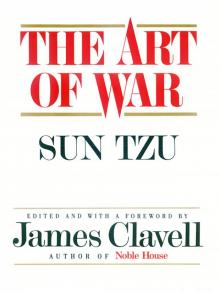 The Art of War
The Art of War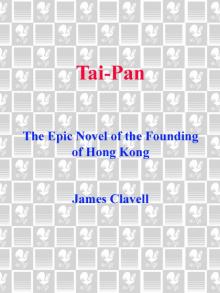 Tai-Pan
Tai-Pan Noble House
Noble House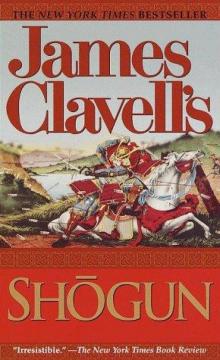 Shōgun
Shōgun Whirlwind
Whirlwind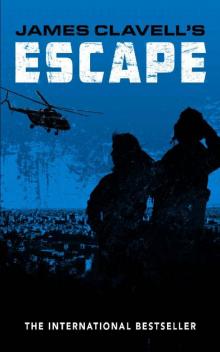 Escape
Escape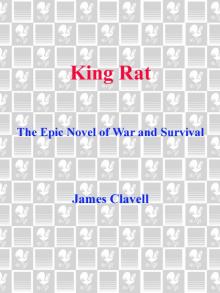 King Rat
King Rat The Children's Story
The Children's Story